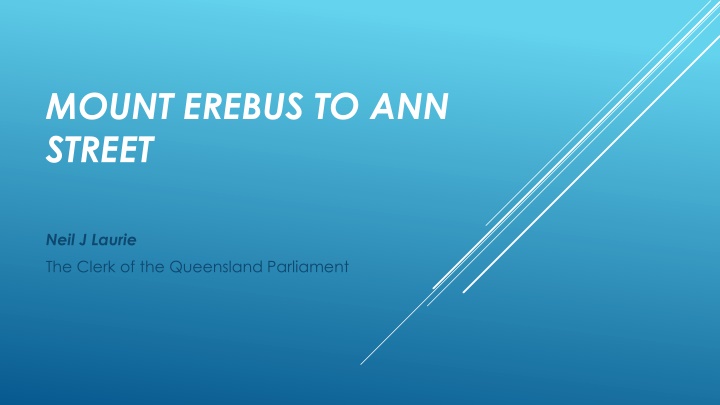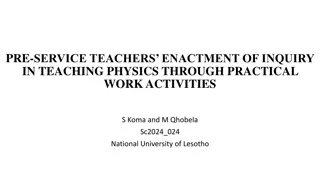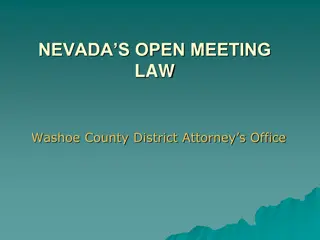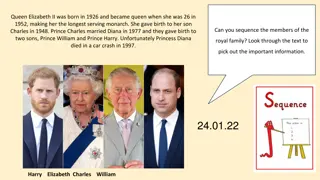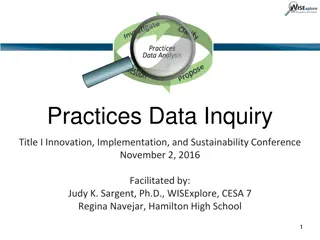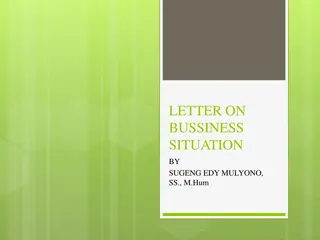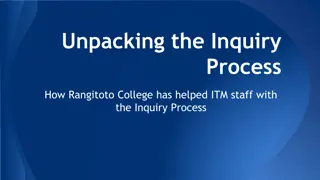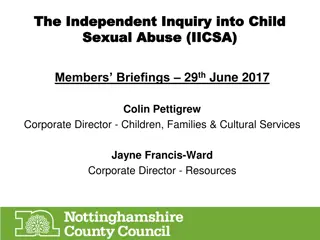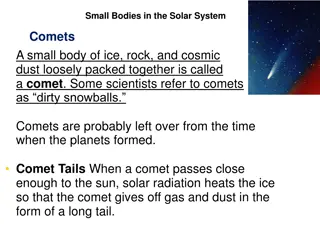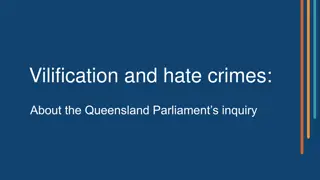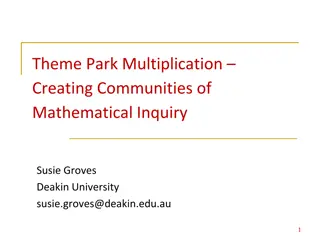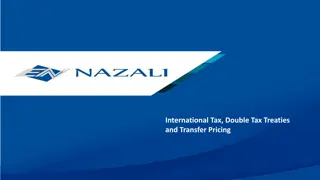Evolution of Permanent Commissions of Inquiry: From Royal Commissions to Investigatory Bodies
Royal Commissions are longstanding tools tracing back to important government inquiries; they inform rather than make legal decisions. The rise of permanent commissions, like Australia's ICAC, addresses failures in government oversight of misconduct and corruption through independent investigations. These bodies aim to rectify shortcomings in the Westminster system, providing essential checks and balances.
Download Presentation

Please find below an Image/Link to download the presentation.
The content on the website is provided AS IS for your information and personal use only. It may not be sold, licensed, or shared on other websites without obtaining consent from the author.If you encounter any issues during the download, it is possible that the publisher has removed the file from their server.
You are allowed to download the files provided on this website for personal or commercial use, subject to the condition that they are used lawfully. All files are the property of their respective owners.
The content on the website is provided AS IS for your information and personal use only. It may not be sold, licensed, or shared on other websites without obtaining consent from the author.
E N D
Presentation Transcript
MOUNT EREBUS TO ANN STREET Neil J Laurie The Clerk of the Queensland Parliament
Royal Commissions are one of the oldest institutions of government, generally reserved for particularly important inquiries. They are tools of the executive branch of government, but have powers normally only associated with the judicial branch of government. They do not decide issues, make decisions or affect the legal status of persons as do courts, but in conducting some inquiries they act in a manner similar to courts. It is the exclusively informative function that gives them their special character. LEONARD ARTHUR HALLETT, ROYAL COMMISSIONS AND BOARDS OF INQUIRY. SYDNEY: LAW BOOK COMPANY, 1982.
The primary function of a Royal Commission is to inform government. Commissions make reports and do not make determinations which alter legal relationships. Investigatory Royal Commissions are concerned about finding the facts, rather than settling disputes between parties. LEONARD ARTHUR HALLETT, ROYAL COMMISSIONS AND BOARDS OF INQUIRY. SYDNEY: LAW BOOK COMPANY, 1982.
THE RISE OF THE PERMANENT COMMISSION OF INQUIRY Hong Kong s Independent Commission of Inquiry (ICAC), established in 1974 was the model for permanent, independent commissions. The trend started in Australia in the late 1980s, for example: Community concern about integrity in the New South Wales public sector and the exposure of corruption among government ministers, within the judiciary and at senior levels of the police force led to the creation of the NSW ICAC in 1988, which began operating in March 1989. Revelations of police misconduct, ministerial misconduct and maladministration in government by the Fitzgerald Inquiry in Queensland and Report recommended the creation of Queensland s Criminal Justice Commission (CJC) and that body came into existence on 31 October 1989.
THE REASONS FOR PERMANENT COMMISSIONS OF INQUIRY The reasons largely lay in the failure of the system of government to deal with misconduct or corruption. History demonstrates that they have almost always arisen out of revelations of misconduct and corruption that existed and flourished because of the inadequacies' of our system of government. They are established to address what former Australian Chief Justice, Sir Harry Gibbs, described as: the symptoms of a general illness of the body politic (Sir Harry Gibbs as cited in Colleen Lewis, Janet Ransley and Ross Homel, The Fitzgerald Legacy: Reforming Public Life in Australia and Beyond Australian Academic Press, 2010, p 1. ) In my opinion, they are attempting to address the deficiencies of the Westminster system of government inherent in small, largely government dominated parliaments (I describe as the Westminster paradox ) which leads to inadequate oversight of government.
THE REASONS FOR PERMANENT COMMISSIONS OF INQUIRY While the form and function of the Crime and Corruption Commission (CCC) have changed over the past three decades, the organisation still has the central role in Queensland s integrity landscape envisaged in the 1989 Fitzgerald Report and remains fundamental to combating major crime and corruption in the state. For that reason, the CCC must remain an independent, fair and impartial body trusted by the public to achieve its important statutory functions Commission of Inquiry relating to the Crime and Corruption Commission, 9 August 2022 p.6
THE REASONS FOR PERMANENT COMMISSIONS OF INQUIRY A principal recommendation of the 1989 Fitzgerald Report was the creation of a body, outside the QPS and independent of it, to oversee and undertake an array of activities focused upon crime and official misconduct a permanent embodiment of elements of the work of the Fitzgerald Inquiry. That Inquiry involved a long and deep examination of what a former Australian Chief Justice, Sir Harry Gibbs, described as: the symptoms of a general illness of the body politic . Its final report sought, as Sir Harry also remarked: not merely to reform the system of criminal justice and to combat corruption, but also to improve the standards of public administration, and to render the workings of Parliament more democratic . Commission of Inquiry relating to the Crime and Corruption Commission, 9 August 2022 p.6
THE RISE OF ADMINISTRATIVE LAW Hallett s 1982 work of 363 pages, devoted 15 pages to the topic of procedural fairness. Hallett identified two rules of natural justice: The hearing rule a person must be given a right (opportunity) to be heard before an adverse finding The impartial rule those who conduct the hearing must be above any reasonable suspicion of bias Hallett noted previous cases where the strict view of commissions not making decisions or affecting rights led to the view that remedies not available in respect of Commissions of Inquiry (Testro v. Tait (1963) 109 CLC 353.)
MOUNT EREBUS DISASTER On 28 November 1979 Air New Zealand Flight 901 crashed into Mount Erebus, a volcano of 12,500 feet on Ross Island, Antarctica. All 237 passengers and 20 crew on board were killed. An investigation by the Chief Inspector of Air Accidents found that the probable cause of the accident was pilot error. Even prior to the Chief Inspectors report being delivered, public dissatisfaction led to the establishment of a Royal Commission of Inquiry into the crash, presided over by Justice Peter Mahon QC. Justice Mahon s report exonerated the captain and crew, laid blame at the feet of Air New Zealand which he accused of presenting to his inquiry a litany of lies and against whom he made an order of costs.
MOUNT EREBUS DISASTER Two years of litigation followed, with the New Zealand Court of Appeal (Re Erebus Royal Commission; Air New Zealand Ltd v Mahon (No 2) [1981] 1 NZLR 618), finding that the judge, in making the order for costs, had acted in breach of the rules of natural justice. The Judicial Committee of the Privy Council in a landmark decision (Mahon v. Air New Zealand [1984] 3 All ER 201; [1983] NZLR 662), upheld the Court of Appeal s finding and established that the rules of natural justice (procedural fairness) applied to Commissions of Inquiry.
MOUNT EREBUS DISASTER Mahon v. Air New Zealand [1984] 3 All ER 201; [1983] NZLR 662) Rules applicable to Commissions of inquiry were expressed to include: (a) that findings are based upon material that logically tended to show the existence of facts consistent with those findings; (b) reasons are not self-contradictory; (c) that natural justice required a commission to ensure that any person that might be affected adversely by a finding should know of the risk of such a finding being made and be given an opportunity to adduce additional material that might deter the commission from making that finding.
APPLICATION OF PRINCIPLES TO ROYAL COMMISSIONS Carruthers v. Connolly [1997] Qld Supreme Court [No. 4924] overwhelming evidence of ostensible bias against Mr Connolly (Commissioner) with respect to matters that his Commission had to consider It is true that the Commissioners' Report will of itself have no direct legal effect upon any person. However the performance of a recommendatory function has not been regarded by the courts as activity of so mean a character that it should not be the subject of judicial review. Indeed, the functions that have been entrusted to this particular Commission are of considerable importance and the investigation and report of the Commission is capable of having extensive consequences both of a public nature and upon reputations. Thomas J
APPLICATION OF PRINCIPLES TO ROYAL COMMISSIONS Keating v Morris & Ors; Leck v Morris & Ors [2005] QSC 243 [158] I am satisfied that each of the applicants has made out a case of ostensible bias in respect of matters arising under the Inquiry s terms of reference. The circumstances established by the accumulated weight of evidence would give rise, in the mind of a fair minded and informed member of the community, to a reasonable apprehension of lack of impartiality on the Commissioner s part in dealing with issues relating to each of the applicants. Similar considerations arise with respect to persons in the position of an applicant. Moynihan J
APPLICATION OF PRINCIPLES TO PERMANENT COMMISSIONS R v Criminal Justice Commission; ex parte Ainsworth & Anor [1990] QSCFC 61. Report on the introduction of poker machines prepared by CJC for cabinet sub-committee. Later, presented as a report to Parliament. Critical of Ainsworth and group of companies. No right to be heard. Report essentially written by journalist based on secondary evidence. Sought order of Mandamus and Certiorari. Full Court (McPherson, Lee and Mackenzie JJ.) held (i) that the course adopted by the Commission was not one which attracted a duty of fairness under the Act (ii) there was no duty of fairness under the general law because the report did not affect any right, interest or legitimate expectation of the appellants (iii) even if there was a duty of fairness, the case was not appropriate for the grant of relief, whether by way of certiorari, mandamus or, as was sought in the course of argument, by way of declaration. The constitutional distribution of power in a democracy proceeds on the footing of mutual respect by legislature and judiciary for the integrity of their respective functions. We should be overstepping the proper limits of our responsibilities by a wide margin if we were to order a writ of certiorari to issue to bring up a record that now forms part of the proceedings of Parliament. McPherson J. at 7.
APPLICATION OF PRINCIPLES TO PERMANENT COMMISSIONS Ainsworth v Criminal Justice Commission [1992] HCA 10 (per MASON C.J., DAWSON, TOOHEY AND GAUDRON JJ. P3) The nature and purposes of the Commission and its organizational units are such that it is unthinkable that it might, in any circumstance whatsoever and whether discharging its functions or responsibilities or merely taking some step in the course of or in relation to them, proceed in a way that is partial or contrary to the public interest. (per MASON C.J., DAWSON, TOOHEY AND GAUDRON JJ. P8) a body established for purposes and with powers and functions of the kind conferred on the Commission and its organizational units is one whose powers would ordinarily be construed as subject to an implied general requirement of procedural fairness, save to the extent of clear contrary provision. That is because it is improbable that, though it did not say so, the legislature would intend that a body of that kind should act unfairly.
STRICT INTERPRETATION OF STATUTES Greiner v ICAC 2 [1992] 28 NSWLR 125 Majority declared that the finding in the Report that each plaintiff had engaged in corrupt conduct within the meaning of the ICAC Act was a nullity. Balog v ICAC (1990) 169 CLR 625 primarily an investigative body whose investigations are intended to facilitate the actions of others in combating corrupt conduct. It is not a law enforcement agency and it exercises no judicial or quasi-judicial function. Its investigative powers carry with them no implication, having regard to the manner in which it is required to carry out its functions, that it should be able to make findings against individuals of corrupt or criminal behaviour, p636
STRICT INTERPRETATION OF STATUTES Independent Commission Against Corruption v Cunneen [2015] HCA 14 Majority restricted the jurisdiction of ICAC to investigate the conduct of third parties in connection with the discharge of official functions by public officials. Justice Gageler (in dissent) the interpretation adopted by the majority would mean that third party conduct such as endemic collusion among tenderers in tendering for government contracts, or serious and systemic fraud in the making of applications for licences, permits or clearances issued under NSW statutes, could not be investigated by ICAC.
CARNE CASE Parliament of Queensland Act 2001: 9 Meaning of proceedings in the Assembly (1)Proceedings in the Assembly include all words spoken and acts done in the course of, or for the purposes of or incidental to, transacting business of the Assembly or a committee. (2)Without limiting subsection (1), proceedings in the Assembly include (a)giving evidence before the Assembly, a committee or an inquiry; and (b)evidence given before the Assembly, a committee or an inquiry; and (c)presenting or submitting a document to the Assembly, a committee or an inquiry; and (d)a document tabled in, or presented or submitted to, the Assembly, a committee or an inquiry; and (e)preparing a document for the purposes of, or incidental to, transacting business mentioned in paragraph (a) or (c); and (f)preparing, making or publishing a document (including a report) under the authority of the Assembly or a committee; and (g)a document (including a report) prepared, made or published under the authority of the Assembly or a committee.
CARNE CASE The best recitation of facts found in judgement of Freeburn J., the dissenting judge in court of appeal. These are the highlights from that recitation: Mr Carne, was the Public Trustee of Queensland from March 2009 until March 2014 and again from March 2016 until his resignation effective from 31 July 2021. By an email on 17 June 2019, the Commission notified the appellant of the Commission s investigation of a complaint and requested an opportunity to conduct: i. A formal disciplinary interview to allow the appellant to hear the allegations against him and to provide comment; and ii. A separate criminal interview concerning matters related to the use of resources of the Public Trust Office. Between June 2019 and January 2020, the Commission and the appellant s solicitors exchanged correspondence about the subject matter of the investigation, and the process for proposed interviews. Meanwhile the investigation continued, On 28 January 2020, the appellant was examined by a psychiatrist. On 13 February 2020, the appellant s solicitors advised the Commission that the appellant was unable to participate in any interview at that time because of the state of his mental health. The appellant did not participate in an interview with the Commission during the period from June 2019 to January 2020 in relation to the Commission s investigation,
CARNE CASE Sometime prior to 6 October 2020, the Crime and Corruption Commission (the Commission) prepared a report on certain allegations against him (the report). On 6 October 2020, the Commission forwarded the report to the Parliamentary Crime and Corruption Committee (the PCCC), a committee of the Queensland Parliament which oversees the Commission and reports to the Parliament. The Commission requested that, under s 69(1)(b) of the Crime and Corruption Act 2001 (Qld) (the CC Act), the PCCC direct that the report be given to the Speaker of Queensland Parliament. The appellant was concerned that such a step would lead to the publication of the report and the report would thereby enter the public domain. And so, the appellant applied to the court for various declarations and injunctions.
CARNE CASE The CCC and the PCCC interactions: In a private meeting held on 19 June 2020, the Chairperson of the Commission advised, in response to an enquiry from the Chairperson of the Committee, that the Commission had not made a final decision on whether to prepare a report in relation to the matter, but he thought the Commission should do so "because it is high profile and it has been in the media". He said that after the show cause process had taken its course, the Commission "probably should articulate some of the concerns that [it] had Crime and Corruption Commission v Carne [2023] HCA 28 at p2 On 11 September 2020 the Chairpersons of the Committee and the Commission met again. The Chairperson of the Committee asked whether the Commission would be seeking a direction under s 69 for the tabling of the report, to which the Chairperson of the Commission responded in the affirmative. He added that he did not see "why we should not publicly report in a matter that has so much public interest and is such an important matter in terms of workplace culture, corruption risks and so forth". Crime and Corruption Commission v Carne [2023] HCA 28 at p3 The Chairperson of the Committee, at the request of the Commission, issued a certificate under s 55 of the Parliament of Queensland Act 2001 (Qld) ("the POQ Act") which, amongst other things, certified that the document titled "An investigation into allegations relating to the former Public Trustee of Queensland: Investigation Report" is "a document prepared for the purposes of, or incidental to, transacting business of the [Committee] under s 9(2)(c) of the [POQ Act]" and a document "presented or submitted" to the Committee. Crime and Corruption Commission v Carne [2023] HCA 28 at p3
CARNE CASE Carne v Crime and Corruption Commission [2022] QCA 141 At trial Davis J dismissed the application by the former Public Trustee, to prevent the Parliamentary Crime and Corruption Committee (PCCC) from providing a copy of a report, at the request of the CCC, to the Speaker of Queensland s Legislative Assembly The primary judge found that the preparation of the report was authorised by s 64 of the CC Act which provides that the Commission may report in performing its functions The report of the CCC is a document which is a report for the purposes of s69 (1) of the CC Act (Crime and Corruption Act 2001) if the PCCC directs the (CCC) to give the report to the speaker. The preparation of the report and resolution of the CCC to seek a direction from the PCCC pursuant to s69 are proceedings of the Parliament.
CARNE CASE Carne v Crime and Corruption Commission [2022] QCA 141 (Court of Appeal) The Court found that, having investigated a complaint of corruption, the task of the CCC was to decide whether proceedings or disciplinary action should be considered. If the CCC decides that proceedings should be considered, it may report, not publicly, but to a prosecuting authority, a head of jurisdiction or the chief executive officer of the relevant unit of public administration. Otherwise, there is no provision by which it is to report. As the CCC had completed its investigation into Mr Carne and decided not to proceed with criminal or disciplinary proceedings, the CCC was not empowered or required to then make the report. Having found the CCC was not empowered or required to make the report, the Majority then held that the report could not then be the subject of parliamentary privilege. Freeburn J. dissented and held that the Commission had the statutory power to prepare the report and that the report was subject to parliamentary privilege. His reasoning was similar to the trial Judge.
CARNE CASE Crime and Corruption Commission v Carne [2023] HCA 28 (High Court) KIEFEL CJ, GAGELER AND JAGOT JJ. at pp 4-5 : The first ground of appeal is to the effect that the Court of Appeal was precluded from making the declaration by the prohibition in s 8(1) of the POQ Act on "proceedings" in the Legislative Assembly being "impeached or questioned" in any court. The Commission argues that its preparation and presentation of the Report were brought within the scope of "proceedings" in the Legislative Assembly by operation of s 9 of the POQ Act. The answer to the first ground of appeal is that the Commission's argument that its preparation and presentation of the Report were brought within the scope of "proceedings" in the Legislative Assembly by operation of s 9 of the POQ Act must be rejected on the facts. Section 9 of the POQ Act was not satisfied because the Report was not prepared for, or presented to, the Committee for purposes of transacting business of the Committee; it was prepared by the Commission and presented to the Committee for the Commission's own purposes. Whether s 8(1) of the POQ Act would have the preclusive effect for which the Commission contends were s 9 satisfied is a large question which does not properly arise for consideration.
CARNE CASE Crime and Corruption Commission v Carne [2023] HCA 28 KIEFEL CJ, GAGELER AND JAGOT JJ. At p5: The second ground of appeal is to the effect that the conclusion of the Court of Appeal that the Report is not a report for the purposes of s 69(1) of the CC Act is erroneous. Consideration of that ground requires examination of the provisions of the CC Act relating to reporting by the Commission and the identification of those reports comprehended by s 69(1). It also requires characterisation of the Report. The answer to the second ground of appeal is that the conclusion of the Court of Appeal is correct: the Report is not a report to which s 69(1) of the CC Act applies. Indeed, there is no provision of the CC Act which authorises a report of this nature.
CARNE CASE Crime and Corruption Commission v Carne [2023] HCA 28 GORDON AND EDELMAN JJ is as follows: We agree with the order proposed by Kiefel CJ, Gageler and Jagot JJ, and would express our reasons in the following way. In short, the Court of Appeal was correct to find that the October Draft was not a report for the purposes of s 69(1) of the CC Act. The declaration sought by Mr Carne, and made by the Court of Appeal, should not be set aside. Parliamentary privilege does not present any obstacle to the declaration made by the Court of Appeal. That is because, on the facts, no question of parliamentary privilege arises; no act was done in the course of, or for the purposes of or incidental to, transacting business of the PCCC to which parliamentary privilege could attach. In particular, the October Draft was not prepared "for the purposes of or incidental to, transacting business" of the PCCC
CARNE CASE - OBSERVATIONS Crime and Corruption Commission v Carne [2023] HCA 28 The High Court s interpretation of the CCC Act was not surprising. The CCC Act is overly complex legislation. One result of a large one stop shop . The interpretation by the CCC over many years (26 years) was not unreasonable, but the High Court s interpretation was equally open and reasonable. The High Court s view was consistent with the general approach of courts on legislation re permanent commissions read it narrowly. Bad practice by the CCC did not assist the matter, providing multiple drafts and including a foreward that was adversely mentioned at the High Court at p.3 The High Court s application of the provisions of the Parliament of Queensland Act 2001 is much more difficult to reconcile.
CARNE CASE - OBSERVATIONS Crime and Corruption Commission v Carne [2023] HCA 28 KIEFEL CJ, GAGELER AND JAGOT JJ. at p9 accepted that motivations or purpose are irrelevant to determining application of the privilege under s. 9 POQ: In argument on this appeal the Speaker of the Legislative Assembly of Queensland, intervening, put that the motivations or purpose of both the person who produces the document and the person who receives it are irrelevant to the question of whether a document is prepared for the purposes of the Assembly or a committee. The Speaker submitted that it is the functional connection, objectively considered, of the document with the Assembly or committee which must be considered. The latter submission should be accepted. In requiring that something be said or done for the purposes of conducting the business of the Assembly or a committee, s 9(1) is clearly concerned with establishing a connection to the work of the Assembly or a committee. However KIEFEL CJ, GAGELER AND JAGOT JJ. at p9 also indicated that preparation or presentation of a document was not sufficient and that some connection to the committee was required: The mere preparation of a document for them, or presentation of a document to them, by a third party will not suffice if there is no other connection to their work at the time the document was prepared. As McPherson JA observed in Rowley v O'Chee, not all mail that is delivered to and received by a member of Parliament attracts privilege.
CARNE CASE - OBSERVATIONS Crime and Corruption Commission v Carne [2023] HCA 28 Similalrly, Gordon J and Edelman J at p.34 stated: The current case may be distinguished from one where a parliamentary committee, upon receiving a document unrelated to the business of the parliamentary committee, elects to retain it for the purpose of transacting its business. In such cases, the application of ss 8 and 9 of the POQ Act would have the result that the document would be privileged. It is difficult to argue that the report was not related to the business of the PCCC. The preparation of the report and the intention to present to the committee was discussed in two separate proceedings of the PCCC. In a private meeting of 19 June 2020 (a proceeding) the Chair of the CCC indicated that he was considering providing a report to the Committee. Then on 11 September 2020, in a meeting (a proceeding) the Chair of the PCCC asked if a report would be presented to the Committee and the Chair of the CCC responded in the affirmative. If an document is simply provided to the committee without preamble and the committee elects to retain it to transact its business can be said to be privileged, how can one the was discussed during two previous proceedings and was anticipated for further action not be privileged
CARNE CASE - OBSERVATIONS Crime and Corruption Commission v Carne [2023] HCA 28 KIEFEL CJ, GAGELER AND JAGOT JJ. at p9 looked to the facts to determine the purpose for the document was not that of the Committee, but that of the Commission: The Committee did not authorise, and cannot be taken to have authorised, the preparation of the Report. That may have been the case if the Committee had directed the Commission to investigate the complaint under s 294 of the CC Act. In such a circumstance the Commission is obliged to report to the Committee with respect to such an investigation. That is not this case. Here the Report was prepared and presented to the Committee for the purpose of it being made public (by having it tabled in the Legislative Assembly). That purpose was that of the Commission. It was not that of the Committee. True it is that the Committee was asked to consider giving a direction under s 69(1)(b) of the CC Act, and would no doubt have done so had the proceedings not been commenced. The Committee agreed not to take that action until the conclusion of the proceedings. Had the Committee commenced consideration of such a direction, the Report may have been the subject of its business, but that point was not reached. The requisite connection is not established on the facts of this case.
CARNE CASE - OBSERVATIONS Crime and Corruption Commission v Carne [2023] HCA 28 KIEFEL CJ, GAGELER AND JAGOT JJ. at p10 dismissed competing facts and ignored that there may be concurrent purposes: This conclusion is not altered by the certificate issued under s 55 of the POQ Act, by which the Chairperson of the Committee certified that the Report was prepared for and presented to the Committee for its purposes. Section 55(2)(d) provides that a certificate stating that a document was prepared for the purposes in s 9(2)(a) or (c) is evidence of that fact. It does not, however, provide that it is conclusive. The s 55 certificate may be rebutted by other evidence. The Commission's statements as to its purpose for preparing the Report do just that. The judgement ignored the fact that the POQ provides that it is the role of the PCCC to receive reports from the CCC and consider whether they should be tabled. The PCCC was in the process of discharging this function when the litigation commenced. The judgement appears to ignore the fact that on a routine basis a Committee may have a purpose (for example, to obtain information to make the most appropriate recommendation) and a submitter may likely have a different but concurrent purpose (for example, to influence the matter under consideration to be favourable to the submitters position).
CARNE CASE - OBSERVATIONS Crime and Corruption Commission v Carne [2023] HCA 28 Let us Bell the Cat : Courts do not like to be ousted from jurisdiction. Parliamentary privilege is an effective ouster from jurisdiction. The High Court have in Carne chose the facts that did not trigger the application of the statute that applied the privilege. The Court ignored other facts. The High Court looked at the purpose of the CCC, but ignored the purposes of the PCCC. The statute does not say (1)Proceedings in the Assembly include all words spoken and acts done in the course of, or for the primary purposes of or incidental to, transacting business of the Assembly or a committee. This looks like the application of justice, not law.
WIDER IMPLICATIONS It is very important that there is judicial supervision of Commissions of Inquiry and Permanent Commissions of Inquiry. For example, in Ainsworth, the CJC ignored any form of natural justice. The Commissioners in Carruthers and Connolly were found to have demonstrated ostensible bias. The courts have made it very clear that they will interpret statutes regarding permanent commissions of inquiry very narrowly. It is incumbent on legislatures to ensure that the statutes creating those bodies are extremely clear as to jurisdiction, power and report. Thus, it is also clear that the court will require clear statutory authority to allow reports that make findings against individuals of corrupt or criminal behaviour. It is now very incumbent on parliaments to make sure their statutes regarding their ICAC like bodies reflect their precise intention. I query whether it is necessary for independent commissions to make finding of conduct in a report to public, rather than a narrative of facts. Let others decide.
To avoid conflict between the courts and parliament, it would be best to avoid a provision like s.69 where a report is provided to a Committee to determine whether a report of a commission should be tabled. It would best to have provisions that leaves the committee out of the mix until presented and automatically tabled. For example, the previous provision: Criminal Justice Act 1988: 2.18 Commission's reports. (1) Except as is prescribed or permitted by section 2.19, a report of the Commission, signed by its Chairman, shall be furnished- (a) to the chairman of the Parliamentary Committee; (b) to the Speaker of the Legislative Assembly; and (c) to the Minister. . (3) If a report is received by the Speaker when the Legislative Assembly is not sitting, he shall deliver the report and any accompanying document to The Clerk of the Parliament and order that it be printed. (4) A report printed in accordance with subsection (3) shall be deemed for all purposes to have been tabled in and printed by order of the Legislative Assembly and shall be granted all the immunities and privileges of a report so tabled and printed. (5) A report received by the Speaker, including one printed in accordance with subsection (2), shall be tabled in the Legislative Assembly on the next sitting day of the Assembly after it is received by him and be ordered by the Legislative Assembly to be printed. (6) No person shall publish, furnish or deliver a report of the Commission, otherwise than is prescribed by this section, unless the report has been printed by order of the Legislative Assembly or is deemed to have been so printed
THE PUBLIC POLICY ISSUE In this instance, the interpretation of the statute means at least 32 CJC/CMC/CCC reports and 256 media releases over 26 years would never had occurred. https://documents.parliament.qld.gov.au/com/PCCC-8AD2/C-A72F/221020%20-%20IN%20- %20Crime%20and%20Corruption%20Commission%20- %20Data%20on%20investigations%20reports_media%20releases%20in%20relation%20to%20CCC%20investigations.pdf The significance of the decision and the implications to the future lay in the list of those reports and media releases. The public would remain in the dark about the outcomes of a large number of investigations where a decision does not result in criminal proceedings. The CCC may be regarded as a permanent commission of inquiry, in that it can inquire and report, but unlike a commissions of inquiry that report the truth of a matter , the CCC has been muzzled. It has long been alleged that the CCC has been used by governments as a clearinghouse . Issues of public concern are sent for investigation and when no criminal conduct is found, government imply there was no wrong doing. (Event though wrongdoing that falls short of criminal conduct is often revealed.) At least to date there has been report or prospect of report where facts are made public and the public can make up their own mind. There is also real benefit in some people wrongly accused or slurred to have a report public.
THE HIDDEN TRUTH Should we be so protective of individual rights (reputation) that it keeps the public in the dark? One result of the litigation in Mahon v. Air New Zealand [1984] 3 All ER 201; [1983] NZLR 662) was that it took 20 years for the reports of the Chief Inspector of Air Accidents and the Mahon Commission to be tabled in the New Zealand Parliament. It took 40 years, for New Zealand s Prime Minister, on behalf of the New Zealand government, to apologise for the actions of the airline, then in full state ownership, and which according to the apology ultimately caused the loss of the aircraft and the loss of life.
THE TRUTH Aristotle said: "To say of what is that it is not, or of what is not that it is, is false, while to say of what is that it is, and of what is not that, is true. 1 Until the statute is remedied, for anyone to say the CCC has investigated and no outcome has occurred, therefore there was no wrongdoing , is not necessarily the truth. 1.David, Marion (2005). "Correspondence Theory of Truth" in Stanford Encyclopedia of Philosophyit is not, is true."
